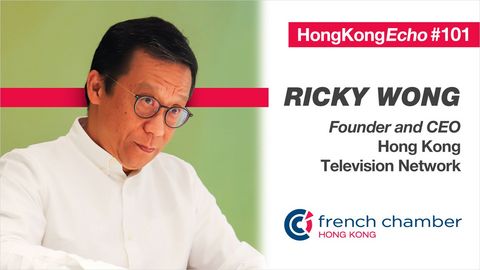Companies news
HongKongEcho: HKTVmall’s founder prepares to go global

Ricky Wong has done it again. The decorated disruptor has made HKTVmall a force to be reckoned with, and this time he’s going global.
The first thing you see is a fleet of bright green trucks. Then, after passing through the mandatory security check, there's a sea of plastic-wrapped groceries. Cans of soft drink, imported Japanese snacks, Korean sweets.
The loading area we just passed through once spilled out into the carpark during the early days of the pandemic, our guide explains, while the company rushed to fulfil a surge in daily orders.
A camera scans our faces as we pass through the main building’s front doors. In real time, an-AI assisted guess of our age and gender is displayed on an accompanying television screen. We put it down to another quirk of 59-year-old HKTVmall founder Ricky Wong’s love for the latest tech.

Finding fame
As the man behind Hong Kong’s largest e-commerce operation, and a string of other previous ventures, Wong possesses a larger-than-life aura. In person, his manner is serious but expressive. “People have always doubted my success,” he says.
Wong earned a small fortune in the 1990s by breaking into the local telecom market offering cheap long-distance calls when he was in his early 20s – technology he had discovered in a short, and otherwise unsuccessful, stay in Canada. At the end of the decade, he established the Hong Kong Broadband Network, accruing heavy losses before going to market with a fibre-to-home service (the largest in the world at the time) in 2005 that blew his competitors’ antiquated copper networks out of the water.
This triumph earned him the status of one of the most disruptive entrepreneurs of his generation. With substantial funds in tow, he set out to shake up another of Hong Kong’s traditionally closed industries – television.
His team began producing lucrative television dramas to rival the likes of local powerhouse TVB, turning his former telecom company into Hong Kong Television Network (HKTV). Its application for a free-to-air licence was, however, unsuccessful and a drastic change of plans was in store.
Wong pivoted to the nascent e-commerce market by launching HKTVmall in 2015. “I’ve always had a firm belief that technology will cause major changes in our behaviours – that goes right back to when we started HKBN.”
Still, his big bet on e-commerce raised plenty of eyebrows. Costs racked up as HKTVmall went all in on scaling up its operations to compete with Hong Kong’s two retail giants, Dairy Farm and AS Watsons.
It built up a network of small brick-and-mortar shops which served as order pick-up points, and helped to onboard swathes of elderly customers who would otherwise be wary of a digital-only offering, while also creating awareness among the general public. Even the company’s primary colour – “sickly green,” Wong chimes in to specify – was chosen to grab your attention.

Overnight changes
Prior to the pandemic, HKTVmall had firmly established itself as a go-to for affordable daily goods, even if the operation had not yet broken even. By 2019 sales had, nonetheless, tripled in the previous three years to HK$1.4 billion.
When 2020 decimated the regular retail world, HKTVmall was well positioned for an uptick in digital demand. It recorded its first net profit last year, a cool HK$183.6 million, putting Wong in the headlines once again. “Actually, in our own forecasts, we had predicted to break even by 2021 – so the pandemic only shifted things by around 12 months," he says.
He is adamant that sales were never a major concern. “My biggest nightmare has been ensuring cost-effective fulfilment. When you’re selling a bottle of water for HK$10 and your labour cost to pack that order is HK$2, it doesn’t make much business sense. We’re able to get it closer to 50 cents per order,” he says.
Such an equation is only possible through investment in technology, he explains. German-made machinery has helped to automate much of the fulfilment process and kept packing costs to a minimum. “The biggest mistake retailers make is that they think e-commerce is about IT and fancy apps when really it’s nothing more than fulfilment.”
That is especially true for HKVTmall’s unique model as a portion of its business relies on brands sending their goods to its warehouse after an order is made, where the products are then consolidated for delivery.
“There are only two e-shopping malls who can rival Amazon in terms of scale, Alibaba is one and we’re the other.”
Every day, over 250,000 people visit the website or app. The platform boasts over 100,000 different products sold by more than 4,000 retailers – a point that is important to underline in differentiating it from other retail powerhouses in the city.
“We’re essentially a digital landlord,” he says. Retailers pay annual fees – or rent – on the platform depending on their size, while HKTVmall also takes a small cut of the sales.
Wong doesn’t want to stop there. “We aim to be at the centre of the digital life of Hong Kong people,” he says. It continues to roll out a plethora of app-based services across a diverse range of segments including virtual payments, insurance, meal deliveries, and second-hand re-selling.
If creating the city’s own all-in-one app wasn’t enough, Wong’s other obsession is a little further from home. “If companies in Europe want to compete with the likes of Amazon, then they have to talk to us,” he says.
While he has no plans to set up his own operations in Europe, Wong intends to sell HKTVmall’s system and expertise to major players on the continent. “There are only two e-shopping malls who can rival Amazon in terms of scale, Alibaba is one and we’re the other.”
The ambitious, and often blunt, statements are in keeping with a CEO who seems to thrive on setbacks. When we ask him for a few words on how his closest colleagues might describe him, he pauses for a few moments. “Tough boss,” he concludes. One of his team members adds their own take from across the room: “A very impatient boss”. He offers a smile in agreement. “I’m always working – often I’ll be sending WhatsApp messages in the middle of the night, not that I expect a reply, but otherwise I’m worried that I’ll forget my idea.”
Finding moments to unwind is not his natural tendency, he admits. Previous holidays include hiking in Nepal, skiing in Japan and Switzerland (a trip he usually takes five or six times a year), and diving with sharks during the Sardine Run in South Africa. His Saturdays are currently spent taking an online course for a medical degree.
“I work with people who have been with me through all kinds of challenges. As a leader, my philosophy has always been that a good soldier needs a battle. Otherwise, they get bored. My job is to create the right battlefield for my team.”











